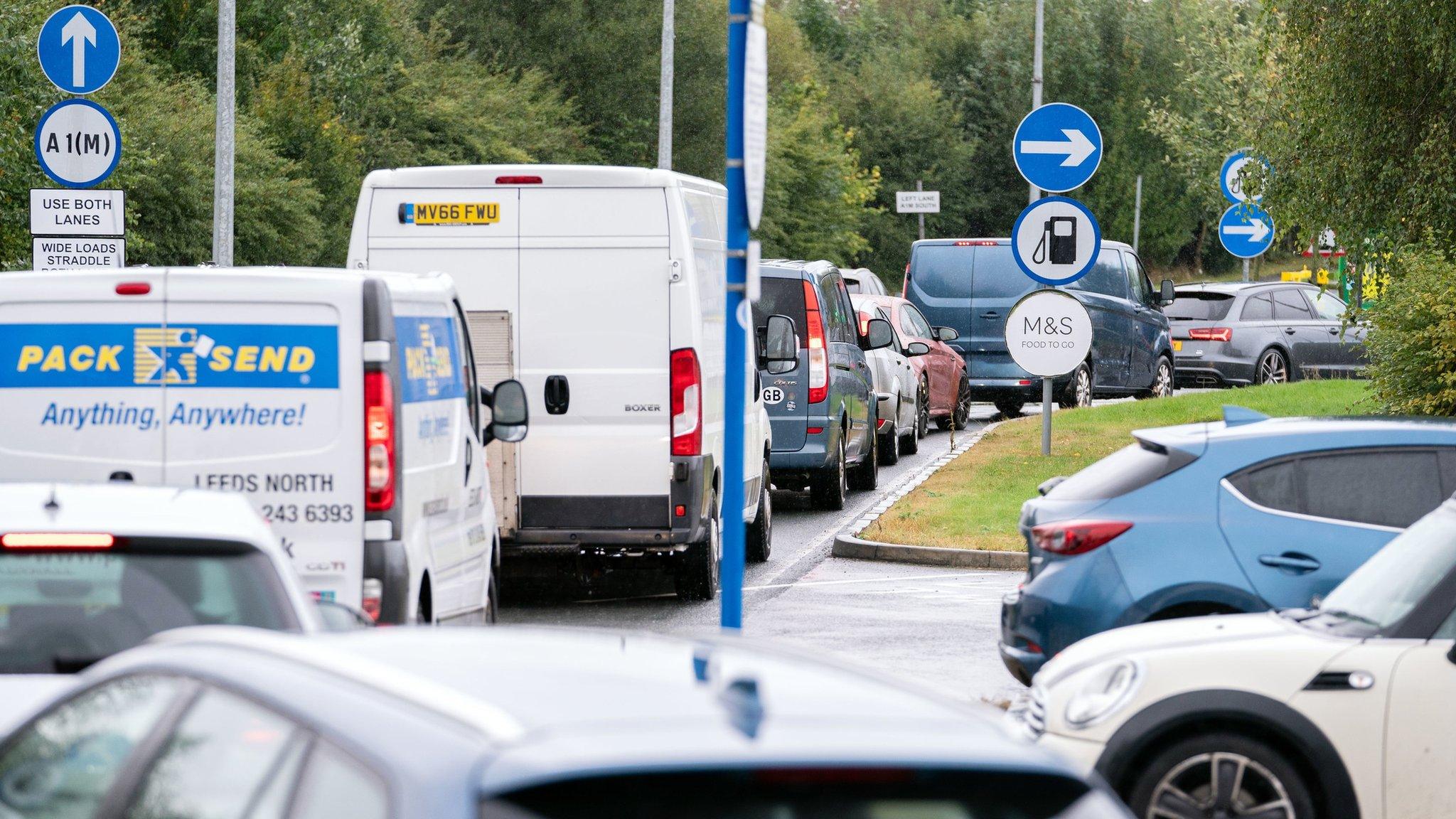Fuel crisis: How key workers have been affected
- Published
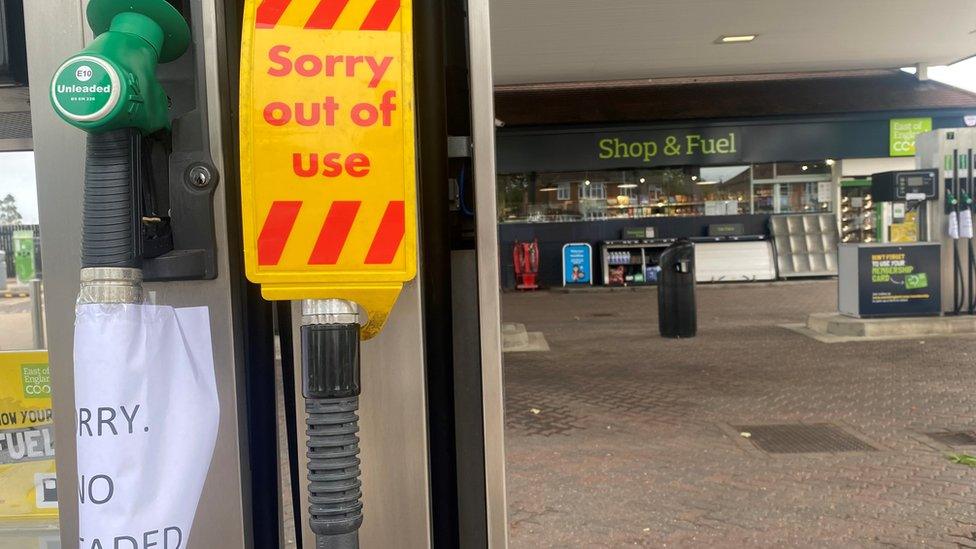
Fuel stations continue to run out due to panic buying
The fuel crisis is into its fifth day as the run on petrol and diesel continues and filling stations struggle to get fresh supplies. For some, the lack of fuel is more than just an inconvenience, it's also life-threatening.

Five carers need fuel

Emma Voglemann is calling on the Prime Minister to make fuel supplies available for key workers
Emma Voglemann who lives in south Cambridgeshire, says without the 24-hour help from her team of five carers her "situation is life-threatening".
The lead policy advisor for the charity Scope uses a wheelchair. Her condition requires the use of a ventilator via a tracheostomy so she can go about her day-to-day life.
Ms Voglemann says the petrol crisis has been extremely challenging for herself and her carers, especially on Monday night when one carer was low on fuel.
"That was after many hours of trying and a lot of stress on her part and on my part," she says.
"Without the carers with me, it's incredibly serious and I know I rely on them completely.
"I'm hoping that by sharing my experience and the worries of other disabled people that they [non-disabled people] will think.
"Do I really need to fill up or am I just getting bit worried to do things I don't need to do, and will my action have an impact on someone else, someone who's providing life-critical care?"

'I thought people won't be that silly again'
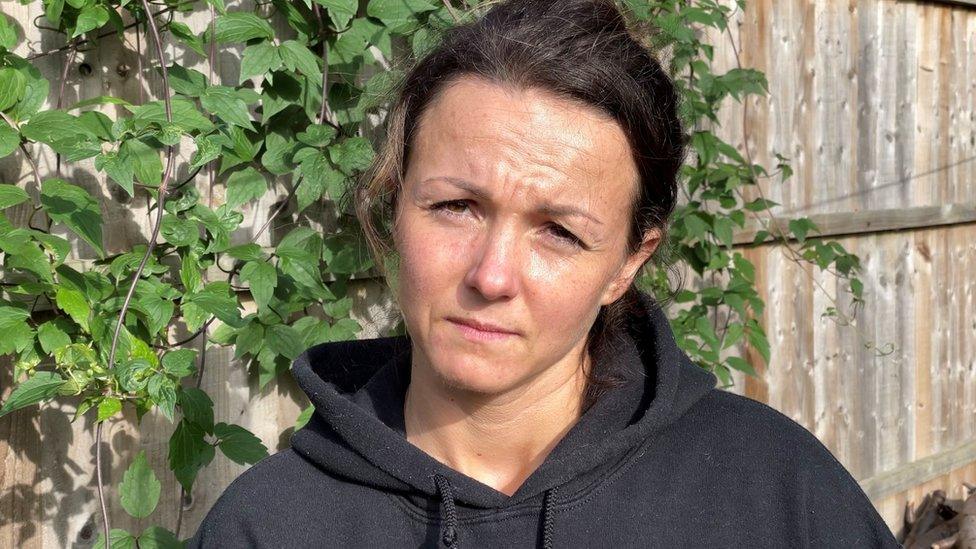
Psychotherapist Patrycja Piatek had to cancel clients as she could not find petrol for her car
Patrycja Piatek is a physiotherapist based at PhysioFixx in Stowmarket, Suffolk.
She realised she was low on fuel on Saturday and tried several filling stations without success.
"I started panicking as I have to drive 70 miles each day. My husband lost fuel searching for fuel and had to stop," she says.
"I was really stressed about that as I knew I had three new patients in with pain who had paid already."
It meant having to cancel appointments for Monday.
Her boss decided to stay on and work late to see three of her new clients, but others had to be rescheduled.
She has since managed to fill her car so she can work for this week at least.
Ms Piatek says she never imagined a second mass panic so soon.
"After last year and the situation with the toilet paper, the pasta and the rice, I thought people won't be that silly again," she says.
"Unfortunately, it's happened and it's affecting pretty much everything."

'Four or five jerry cans'
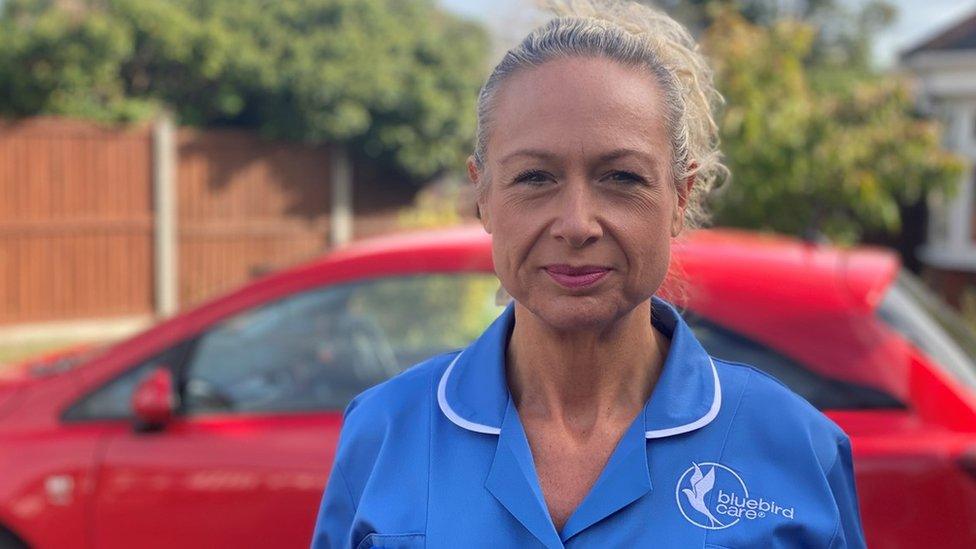
Jenny Irons is calling on the public to stop panic-buying
Bluebird Care assistant Jenny Irons wants people to be more considerate.
"It is quite sad when you think a year ago when everyone was out applauding the NHS for the great work they're doing, but now, no-one's thinking of those people that do the hard work," she says.
"There's still Covid around and they are stopping the doctors, the nurses from doing their job."
Ms Irons works in Clacton, Essex, with end-of-life patients, helping to administer medicines or provide them with a drink or food.
"It's getting a bit ridiculous to be honest. There's people like me that rely on petrol every single day to get to my customers and they rely on us," she says.
She would "absolutely" welcome priority lanes at petrol stations for key workers.
"We all have our passes to prove who we are," she adds.
"I have seen people filling up their cars and then get four or five jerry cans out and start filling them up, it is really frustrating."

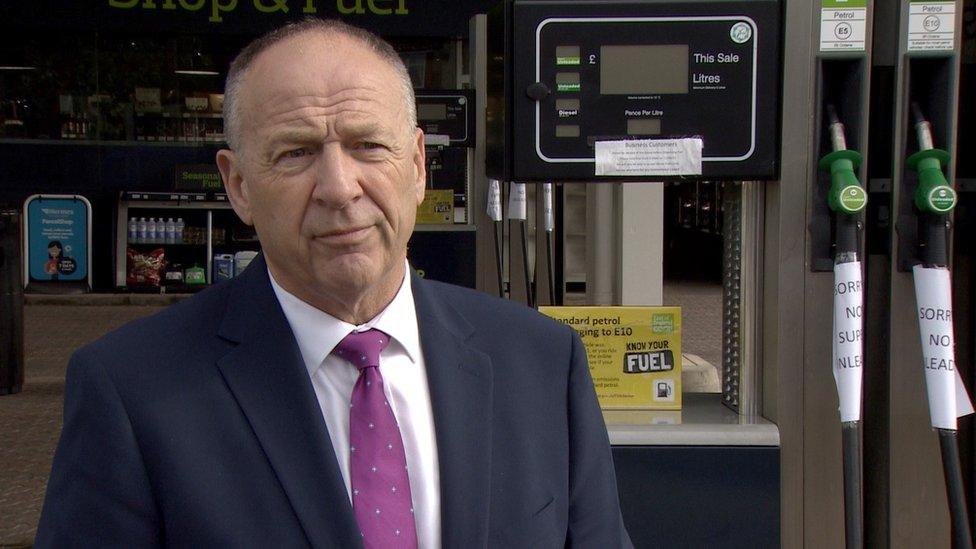
Roger Grosvenor said his Co-Op petrol stations in the East of England would prioritise key workers from Thursday
Calls to allow filling stations to give essential workers priority have not gone unheard by one firm of fuel suppliers.
Roger Grosvenor, joint chief executive for the East of England Co-op, says if there are still fuel issues on Thursday, all its petrol stations in Suffolk and Essex will only serve key workers when they open, from 06:00 to 07:00 BST.
"We're very sympathetic to the key workers. We're waiting to see how the demand continues and hopefully it'll burn out," he says.
"But if it doesn't, we're going to open the first hour just for key workers.
"They'll be security on site to ensure we can look after them."
Mr Grosvenor says, in most cases, customers had been good-humoured with no issues reported by staff.
He says a petrol station such as the one in Nacton Road, Ipswich would normally require refilling "three, sometimes four times a week".
But he adds it is selling a week's worth of fuel, some 127,000 litres, in one day.
"There's a long-standing problem with regards to numbers of [fuel tanker] drivers available, but the panic-buying has exacerbated it," he says.
"We were managing to cope, but suddenly when demand went up, the infrastructure just broke down.
"Hopefully it will start to abate, but it will take a week or more to get filling stations back full of fuel."
Brian Madderson, chairman of the Petrol Retailers Association (PRA), says trying to decide who is and is not an emergency worker and how they would prove this in petrol stations is "very complex".
The PRA also says there are "early signs that the crisis at pumps is ending".
The group, which represents independent forecourts across the UK, says more of its members are "now taking further deliveries of fuel".
It added that 37% of forecourts have reported being out of fuel this Tuesday, but that percentage "is likely to improve further over the next 24 hours".
Asked about the prospect of priority for key workers, Transport Secretary Grant Shapps says he will keep a "close eye" on the situation and the government will do "whatever it takes".
The Army has been put on standby to help, the government says.

Find BBC News: East of England on Facebook, external, Instagram, external and Twitter, external. If you have a story suggestion email eastofenglandnews@bbc.co.uk
Related topics
- Published28 September 2021
